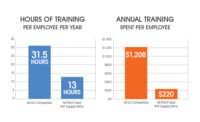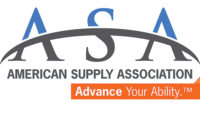If you examine activities like VMI, functional discounts, the IPD/VMD 23 benchmarking criteria, NAW's four scenarios for the future and e-commerce, you see the crying need for a much higher and constantly increasing level of competency in the workforce of all the channels. The need is alluded to, or even stated directly, in discussing the future, but we still need to define and deliver the knowledge, attitudes, skills and habits our employees will need to execute the above concepts.
Recent Education Foundation research indicates that only about 40% of ASA member companies have quantified their learning needs into a training budget. That fact illustrates a significant gap between our current state of training and where we need to go to survive and prosper. One can start closing that gap with job descriptions that detail what a person has to know and be able to do in terms of the outcomes of the jobs rather than just their tasks. The Foundation provides a free training planner on its website for this purpose.
When yearly business plans are developed, the learning and human performance implications need to be stated. Strategic plans and new business initiatives must include a human resource strategy in the execution plan. It is also critical to document the potential savings or new income that results from the training so that the returns can be balanced against the cost. The bean counters must be satisfied.
In order to build a learning organization, all employees need a foundation in the basics of the business that includes knowing the products you handle, understanding the customers you serve and embracing the economics that provides the logic for the entire enterprise. ASA's newest program "Essentials of Profitable PHCP Distribution" will help the wholesaler bring the employees into the game, to embrace the ethic and to participate with greater enthusiasm.
What this all comes down to is that the ultimate survival skill will be the ability to learn and adapt quickly. Like any other exercise, learning gets better, more efficient and more effective the more it is practiced. We might as well get started. If all the discussions of the future scenarios teach us nothing else, it should be that the learning organization will rule the uncertain future.




